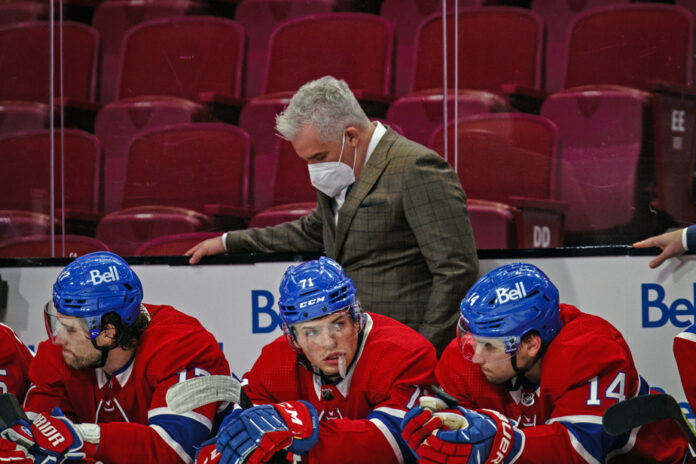No matter how difficult a match can be, there is always hope to cling to: in 10, 60 or 120 minutes, it will be over. When I think back to the worst thaw I’ve ever witnessed, it’s a sequence that comes to mind. Very precisely, the 14 matches that the Canadian played from December 28, 2021 to February 8, 2022. Like a long thaw of which we knew neither when nor how it was going to end. Hit hard by injuries and COVID-19, the CH had compiled a record of 1-9-4, allowing in the meantime no less than 70 goals: 5 per game, yes. Some key defeats: 5-2 in Florida, with an incomplete roster; 8-2 Minnesota, with Michael McNiven in relief in the third period; 7-2 against the Edmonton Oilers, with Zack Kassian decapitating Montembeault without ever being disturbed… This slow-motion train accident sounded the death knell for head coach Dominique Ducharme. The team did not have much more success that season under his successor Martin St-Louis. It was still less difficult to watch.
At the Tokyo Olympics, the women’s water polo tournament hosted a team that was far too weak: South Africa. Three matches, three massacres: 21-1 against the Canadians, 29-4 against the Spanish and 33-1 against the Dutch. I partly witnessed the thaw against the Spanish: 29 goals, that’s almost one per minute (a match lasts 32 minutes). It was uncomfortable. Otherwise, I was at the Olympic Stadium when the Montreal Machine was crushed 44-0 by the New York-New Jersey Knights. This was our first and last Machine match as a family.
I’m going to cheat slightly. This was not a match I attended, but a result that broke my teenage heart. In 1981, Montreal Alouettes owner Nelson Skalbania decided to “buy” a championship. He got his hands on one of the best quarterbacks in the NFL, Vince Ferragamo, 30 touchdown passes with the Los Angeles Rams the previous season, for $600,000, a huge sum at the time, almost the triple the Rams’ offer. Skalbania had also snatched from the NFL Billy “White Shoes” Johnson, from the Houston Oilers, one of the most spectacular kick returners south of our borders, member of the all-star team in 1975 and 1977, the running back running back David Overstreet, 13th overall pick in 1981 by the Miami Dolphins after a fantastic season at the University of Oklahoma, wide receiver James Scott, 36 catches for 696 yards with the Chicago Bears, and l Defensive end Keith Gary, another first-round pick in 1981, 17th overall, by the Pittsburgh Steelers. Who was going to be able to defeat the Alouettes with this collection of stars? The Montreal team played its first game of the regular season in Vancouver against the Lions, at a time when I had been in bed for a long time due to the time difference and being 12 years old. I remember rushing, feverishly, to the front door the next morning, to pick up Sunday Morning (La Presse was not published on Sundays) to find out the result of the meeting. I almost dropped the newspaper when I saw the headline: Vancouver Lions 48, Montreal Alouettes 8. That year, the Alouettes finished the season with a 3-13 record and most of the American stars had already evaporated the following season for the start of the season of this team now called the Concordes de Montréal…
I was not there, but I covered remotely the second Montreal Impact match against Santos Laguna, in 2009, in Mexico. A CONCACAF Champions League quarter-final clash. The Impact made people dream with a 2-0 victory in the first leg, played at the Olympic Stadium in front of more than 55,000 fans, one of the good atmospheres I have experienced in person. At one point in the return match, the Impact led 4-1 in total goals. Plane tickets were almost sold out for the semi-final of the tournament. Then, boom, a goal, boom, a second goal. The Impact leads by one at the start of stoppage time. Boom, tie… Then… boom, Santos Laguna victory. The stabs driven in at 90 2, then at 90 5 by Quintero. The result of the match is not in itself a thaw, but this end of the match remains one of the most spectacular sporting collapses that I have seen with my eyes.















